仁爱版英语八年级上册Unit2Topic1SectionA教学设计
- 格式:doc
- 大小:51.52 KB
- 文档页数:7
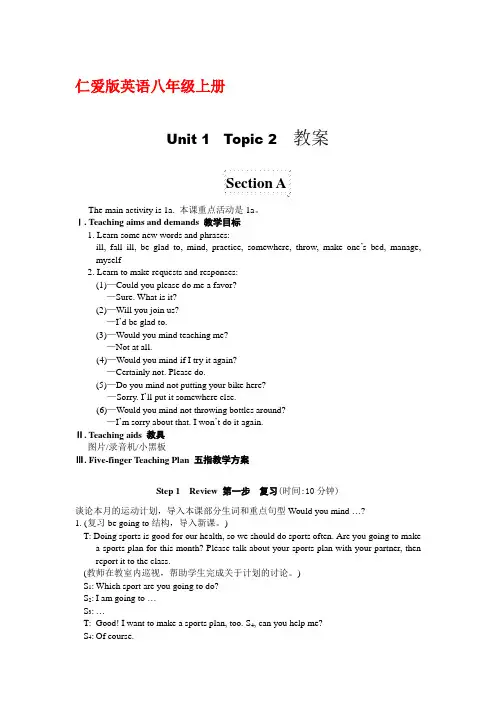
仁爱版英语八年级上册Unit 1 Topic 2 教案Section AThe main activity is 1a. 本课重点活动是1a。
Ⅰ. Teaching aims and demands 教学目标1. Learn some new words and phrases:ill, fall ill, be glad to, mind, practice, somewhere, throw, make one’s bed, manage, myself2. Learn to make requests and responses:(1)—Could you please do me a favor?—Sure. What is it?(2)—Will you join us?—I’d be glad to.(3)—Would you mind teaching me?—Not at all.(4)—Would you mind if I try it again?—Certainly not. Please do.(5)—Do you mind not putting your bike here?—Sorry. I’ll put it somewhere else.(6)—Would you mind not throwing bottles around?—I’m sorry about that. I won’t do it again.Ⅱ. Teaching aids 教具图片/录音机/小黑板Ⅲ. Five-finger Teaching Plan 五指教学方案Step 1 Review 第一步复习(时间:10分钟)谈论本月的运动计划,导入本课部分生词和重点句型Would you mind …?1. (复习be going to结构,导入新课。
)T: Doing sports is good for our health, so we should do sports often. Are you going to makea sports plan for this month? Please talk about your sports plan with your partner, thenreport it to the class.(教师在教室内巡视,帮助学生完成关于计划的讨论。
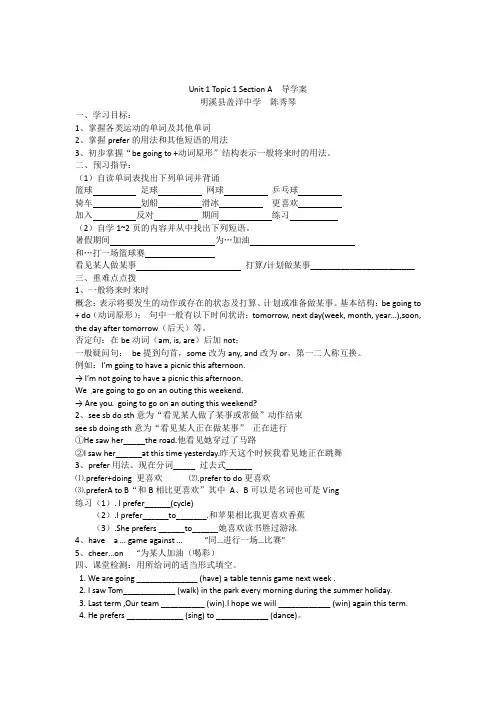
Unit 1 Topic 1 Section A 导学案明溪县盖洋中学陈秀琴一、学习目标:1、掌握各类运动的单词及其他单词2、掌握prefer的用法和其他短语的用法3、初步掌握“be going to +动词原形”结构表示一般将来时的用法。
二、预习指导:(1)自读单词表找出下列单词并背诵篮球足球网球乒乓球骑车划船滑冰更喜欢加入反对期间练习(2)自学1~2页的内容并从中找出下列短语。
暑假期间为…加油和…打一场篮球赛看见某人做某事打算/计划做某事________________________三、重难点点拨1、一般将来时来时概念:表示将要发生的动作或存在的状态及打算、计划或准备做某事。
基本结构:be going to + do(动词原形);句中一般有以下时间状语:tomorrow, next day(week, month, year…),soon, the day after tomorrow(后天)等。
否定句:在be动词(am, is, are)后加not;一般疑问句:be提到句首,some改为any, and改为or,第一二人称互换。
例如:I’m going to have a picnic this afternoon.→ I’m not going to have a picnic this afternoon.We are going to go on an outing this weekend.→ Are you going to go on an outing this weekend?2、see sb do sth意为“看见某人做了某事或常做”动作结束see sb doing sth意为“看见某人正在做某事”正在进行①He saw her_____the road.他看见她穿过了马路②I saw her______at this time yesterday.昨天这个时候我看见她正在跳舞3、prefer用法。
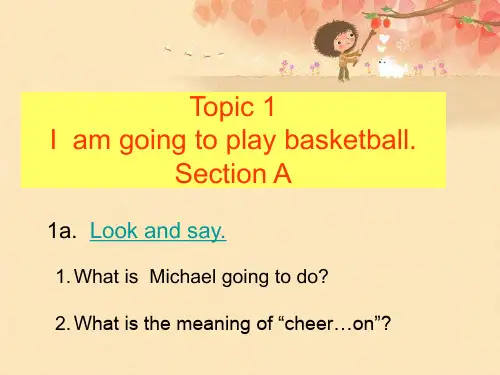
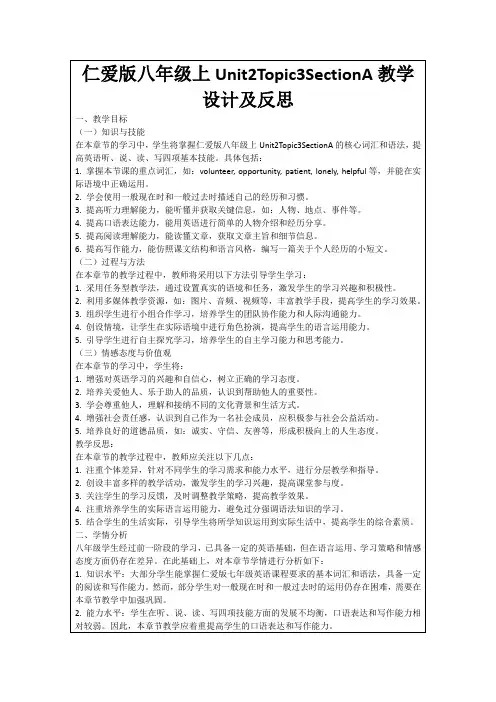
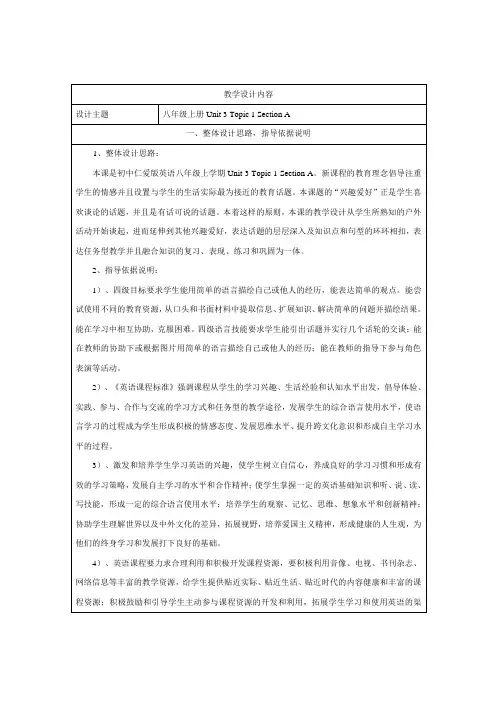
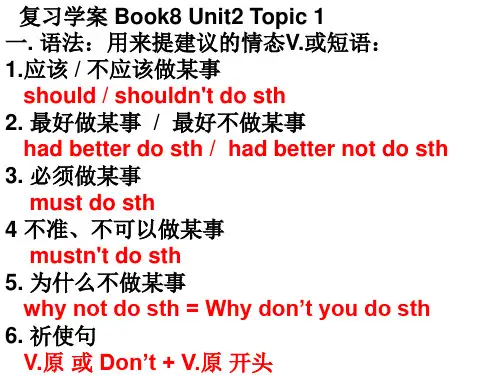
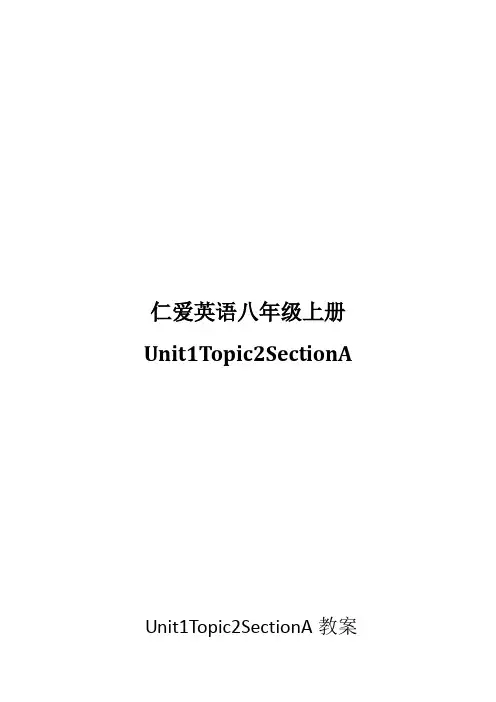
仁爱英语八年级上册Unit1Topic2SectionAUnit1Topic2SectionA教案Step1 Warming up &Review(1)Let the students sing and dance the song 《The chicken dance》(2)Let the students make up a conversation, using the followingquestions:1.What is your favorite sport?2.Who is your favorite player?3.What are you going to be when you grow up?Choose one pair to act it outStep2 Leading inLook at the picture on the PPTT: what is it?Ss: It is a football.T: Can you play it?Ss:…T: Do you know how to play it?Ss:…T: Well, today let us learn Unit1 Topic2 SectionA I will kick the ball.Step3 Prestation1.Let the Ss read the learning aims together2.Work in groups &read 1aTry to ask some questions or find out some requests, and writethe questions on the blackboard3.Check out the questions & summarize the questions as follows:1)Which class are they going to play against?2)What’s wrong with Kangkang’s teammate?3)Would Kangkang mind teaching him?4.Read 1a again & find out the answers in groups, write the answerson the blackboard.5.Check out the answers6.Read 1a in roles and choose one pair to act it out.Step4 Practice and Explain the key points1.Listen to 1a and finish 1b,check out the answers in groups.2.Look at the phrases ,let the Ss explain the Chinese meaning andfinish 1c.Check out it by groups.3.Teaching the Ss key points and practice the exercises on PPT.4.Writing the answers on the blackboard and check out it one byone.pile exercises by the Ss, then finish them and check.Step5 Summary and Homework后附:随堂练习题课后作业Exercise1.根据句意及首字母提示补全单词1.—Do you m opening the window? It's too hot.—Of course not.2.Kangkang,I'll t the ball to you. Catch!3.Lily must hide(躲)s else, because I can't seeher.4.Please p me the book.5.—Would you mind teaching me?—C not.2.根据汉语提示填空。
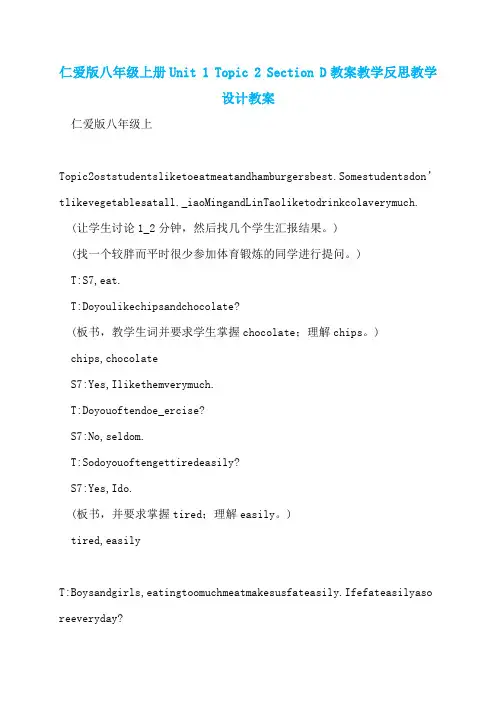
仁爱版八年级上册Unit 1 Topic 2 Section D教案教学反思教学设计教案仁爱版八年级上Topic2oststudentsliketoeatmeatandhamburgersbest.Somestudentsdon’tlikevegetablesatall._iaoMingandLinTaoliketodrinkcolaverymuch. (让学生讨论1_2分钟,然后找几个学生汇报结果。
)(找一个较胖而平时很少参加体育锻炼的同学进行提问。
)T:S7,eat.T:Doyoulikechipsandchocolate?(板书,教学生词并要求学生掌握chocolate;理解chips。
)chips,chocolateS7:Yes,Ilikethemverymuch.T:Doyouoftendoe_ercise?S7:No,seldom.T:Sodoyouoftengettiredeasily?S7:Yes,Ido.(板书,并要求掌握tired;理解easily。
)tired,easilyT:Boysandgirls,eatingtoomuchmeatmakesusfateasily.Ifefateasilyaso reeveryday?Ss:Yes,orefromnoileT:OK.Noorning,eatfreshfruit,instead,insteadof,build…up,feel T:Accordingtothekeyakeanintervieeetyou!S2:Nicetomeetyou,too!S1:Youlooksoactive.Couldyoupleasetellmeakesyousofitandhealthy? S2:Runningandhealthyeating.S1:berthepictures.2.(做游戏。
练习抱怨与道歉、要求与应答的表达方式。
)(游戏规则如下:把全班同学分成两组(若班级人数多,可先让一半同学参与),排成两列纵队,当教师给出一个提示词组时,第一组的第一个同学要快速说出相应的抱怨或要求的表达方式;随后,第二组的第一个同学快速说出相应的道歉或应答的表达方式;接着,教师给出第二个提示词,这次,由第二组的第二个同学说出相应的抱怨或要求的表达方式,随后,第一组的第二个同学要说出相应的道歉或应答的表达方式。

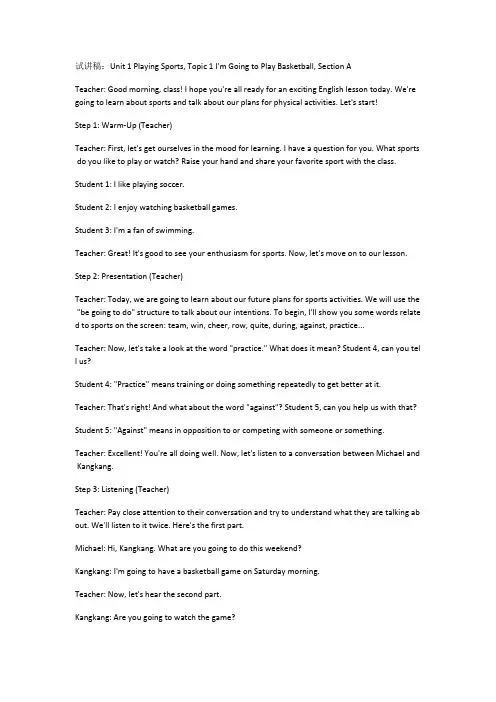
试讲稿:Unit 1 Playing Sports, Topic 1 I'm Going to Play Basketball, Section ATeacher: Good morning, class! I hope you're all ready for an exciting English lesson today. We're going to learn about sports and talk about our plans for physical activities. Let's start!Step 1: Warm-Up (Teacher)Teacher: First, let's get ourselves in the mood for learning. I have a question for you. What sports do you like to play or watch? Raise your hand and share your favorite sport with the class.Student 1: I like playing soccer.Student 2: I enjoy watching basketball games.Student 3: I'm a fan of swimming.Teacher: Great! It's good to see your enthusiasm for sports. Now, let's move on to our lesson.Step 2: Presentation (Teacher)Teacher: Today, we are going to learn about our future plans for sports activities. We will use the "be going to do" structure to talk about our intentions. To begin, I'll show you some words relate d to sports on the screen: team, win, cheer, row, quite, during, against, practice...Teacher: Now, let's take a look at the word "practice." What does it mean? Student 4, can you tel l us?Student 4: "Practice" means training or doing something repeatedly to get better at it.Teacher: That's right! And what about the word "against"? Student 5, can you help us with that?Student 5: "Against" means in opposition to or competing with someone or something.Teacher: Excellent! You're all doing well. Now, let's listen to a conversation between Michael and Kangkang.Step 3: Listening (Teacher)Teacher: Pay close attention to their conversation and try to understand what they are talking ab out. We'll listen to it twice. Here's the first part.Michael: Hi, Kangkang. What are you going to do this weekend?Kangkang: I'm going to have a basketball game on Saturday morning.Teacher: Now, let's hear the second part.Kangkang: Are you going to watch the game?Michael: Yes, I am. I'm going to cheer you on!Teacher: Good job, everyone! Now, let's move on to some exercises to practice what we've learn ed.Step 4: Practice (Teacher)Teacher: I have a fun activity for you. I'll show you some pictures of different sports, and you'll us e "be going to do" to make sentences about your plans for the weekend. For example, "I'm going to play soccer."Teacher: Student 6, let's start with you. What are you going to do this weekend?Student 6: I'm going to swim.Teacher: Excellent choice, Student 6! Swimming is a great way to stay active and enjoy the water. Keep it up!Teacher: Student 7, your turn. What are your plans?Student 7: I'm going to row a boat.Teacher: Wonderful, Student 7! Rowing can be a peaceful and enjoyable activity. Keep exploring new experiences.Step 5: Group Activity (Teacher)Teacher: I'll divide you into groups of four. In your groups, create a dialogue using the "be going t o do" structure. Each of you should talk about your weekend plans related to sports. Use the wor ds we learned today.Teacher: Group 1, can you share your dialogue with the class?Group 1 Representative: Sure! I'm going to play basketball with my friends on Saturday. We're go ing to have a basketball game against another team. We're all excited to win!Teacher: That's fantastic, Group 1! Keep practicing and enjoy the game. Remember, teamwork m akes the dream work!Teacher: Group 2, it's your turn.Group 2 Representative: We're going to watch a soccer match on Sunday. We prefer watching so ccer games over playing.Teacher: Great choice, Group 2! Watching live matches can be inspiring and a great way to learn more about the game. Enjoy the match!Step 6: Additional Practice (Teacher)Teacher: Let's do one more exercise before we finish. In pairs, discuss your favorite sports and w hy you like them. Use the word "prefer." For example, "I prefer playing tennis because it's fun."Teacher: Student 8, can you tell us your favorite sport and why you prefer it?Student 8: I prefer swimming because it's refreshing, and I love the feeling of being in the water.Teacher: That's wonderful, Student 8! Swimming is not only refreshing but also a fantastic full-bo dy workout. Keep enjoying your time in the water.Step 7: Conclusion and Encouragement (Teacher)Teacher: That brings us to the end of our lesson today. You've all done a fantastic job discussing y our sports plans using the "be going to do" structure and expressing your preferences.Teacher: I want to encourage each of you to keep practicing your English, especially when talking about your hobbies and interests. The more you use it, the more confident you'll become.Teacher: Also, if you're interested in sports, consider reading articles or watching videos about sp orts in English. It's a great way to improve your vocabulary and comprehension skills.Teacher: Keep up the excellent work, and I'm looking forward to hearing about your weekend sp orts adventures in your essays. Have a fantastic day, everyone, and see you next time!Step 8:Homework Assignment and Study Tips (Teacher)Teacher: Your homework is to write an essay about your weekend sports plans. Use the "be goin g to do" structure and include details about what you prefer doing. Remember to proofread your work and check for any grammar mistakes.Teacher: Here's a study tip: Try to incorporate English into your daily life by setting specific goals, like watching an English sports commentary or reading an English sports article regularly.Teacher: Have a wonderful day, everyone, and see you next time!。
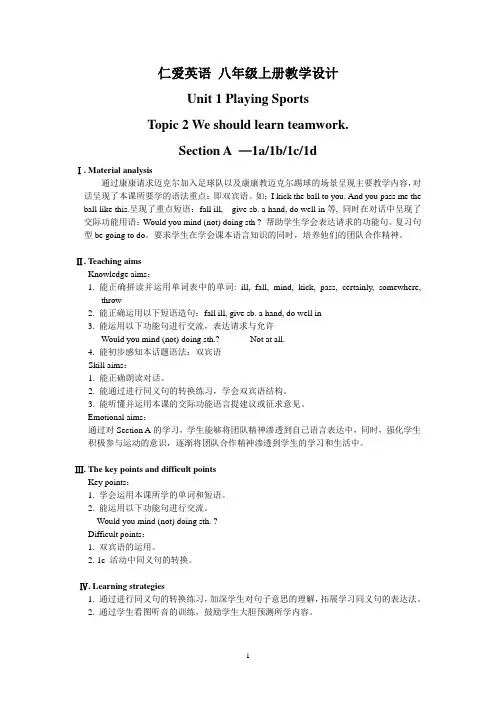
仁爱英语八年级上册教学设计Unit 1 Playing SportsTopic 2 We should learn teamwork.Section A —1a/1b/1c/1dⅠ. Material analysis通过康康请求迈克尔加入足球队以及康康教迈克尔踢球的场景呈现主要教学内容,对话呈现了本课所要学的语法重点:即双宾语。
如;I kick the ball to you. And you pass me the ball like this.呈现了重点短语:fall ill, give sb. a hand, do well in等, 同时在对话中呈现了交际功能用语:Would you mind (not) doing sth ? 帮助学生学会表达请求的功能句。
复习句型be going to do。
要求学生在学会课本语言知识的同时,培养他们的团队合作精神。
Ⅱ. Teaching aimsKnowledge aims:1. 能正确拼读并运用单词表中的单词: ill, fall, mind, kick, pass, certainly, somewhere,throw2. 能正确运用以下短语造句:fall ill, give sb. a hand, do well in3. 能运用以下功能句进行交流,表达请求与允许Would you mind (not) doing sth.? Not at all.4. 能初步感知本话题语法:双宾语Skill aims:1. 能正确朗读对话。
2. 能通过进行同义句的转换练习,学会双宾语结构。
3. 能听懂并运用本课的交际功能语言提建议或征求意见。
Emotional aims:通过对Section A的学习,学生能够将团队精神渗透到自己语言表达中,同时,强化学生积极参与运动的意识,逐渐将团队合作精神渗透到学生的学习和生活中。
Ⅲ. The key points and difficult pointsKey points:1. 学会运用本课所学的单词和短语。
Unit 2 Keeping Healthy
Topic 1 You should brush your teeth twice a day.
(Section A)教学设计
[Material analysis]
第二单元谈论如何保持健康。
话题一介绍了感冒、头疼等常见病的名称,出现了疾病名称的词:toothache, backache, fever, cough, headache, stomachache 等以及相对应的短语:have a cold, have a fever, have a cough, have a headache, have a toothache, have a backache, have a stomachache等。
通过Kangkang 和Betty的对话,呈现了询问生病情况的对话:What’s wrong with you? I have a …等,以及表达关心所提的建议:You should…和You shouldn’t…。
本课的语法重点是You should…和You shouldn’t…。
语言功能方面要求学生学会用英语描述疾病并能就疾病征求他人意见、给他人提建议等。
要求学生能在课后用英语写一篇描述疾病并提出有益健康的提建议的文章。
[Teaching aims]
Knowledge aims:
1. 能正确运用以下短语进行书面表达:
have a cold, have a fever, have a cough, have a headache, have a toothache,
have a backache, have a stomachache等。
2. 能正确地运用should, shouldn’t 提建议:
You should drink enough boiled water.
You shouldn’t drink coffee or tea in the evening.
Skill aims:
1. 能听懂有关日常小病的名称及相关话题。
2. 能熟练地运用should,shouldn’t针对日常小病提建议。
3. 能正确朗读介绍日常小病的对话或文章。
4. 能用should, shouldn’t 结合本单元短语描述日常生活小病并提出有益的建
议。
Emotional aims:
通过语言学习,影响学生的自身品格,要学会信任他人、关心他人,为我们的健康生活创建友爱、和谐的氛围。
[The key points and difficult points]
Key points:
have a cold, have a fever, have a cough, have a headache, have a toothache, have
a backache, have a stomachache等短语的理解及运用。
Difficult points:
就日常小病用英语提建议。
[Learning strategies]
1. 培养学生根据图片猜单词意思的能力。
2. 培养学生模仿已有例句造句的能力。
[Teaching aids]
Computer multimedia projector, pictures of different illnesses
Everyday saying: Bitter pills may have wholesome effects. 良药苦口利于病。
[Teaching procedures]
[Blackboard design]。